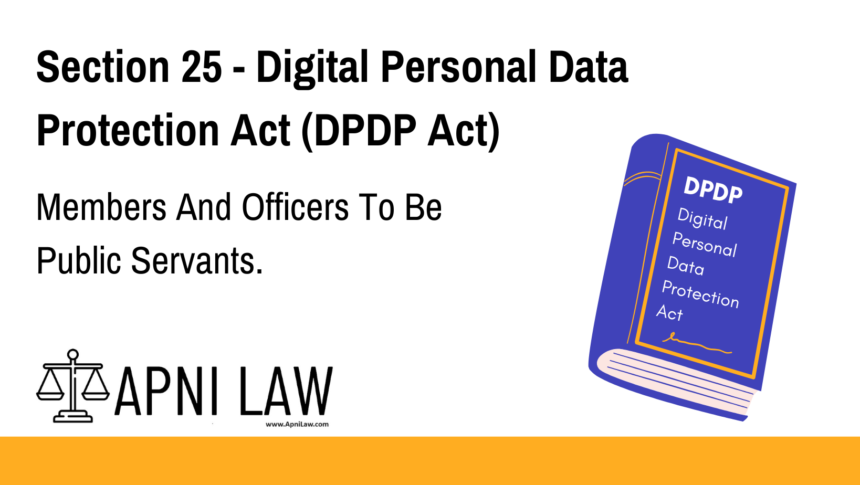Code: Section 25
The Chairperson, Members, officers and employees of the Board shall be deemed,
when acting or purporting to act in pursuance of provisions of this Act, to be public
servants within the meaning of section 21 of the Indian Penal Code.
Explanation of Section 25 DPDP
Section 25 of the Digital Personal Data Protection Act, 2023 declares that the Chairperson, Members, officers, and employees of the Data Protection Board of India shall be considered “public servants” while discharging their duties under this Act.
This designation is made with reference to Section 21 of the Indian Penal Code, which defines “public servants” and outlines their duties and legal responsibilities.
Key Takeaways:
- This status offers legal recognition and protection to those performing official duties under the DPDP Act.
- It also holds Board members and staff accountable under anti-corruption and misconduct provisions applicable to public servants.
- It ensures they act with transparency, responsibility, and within the bounds of public service ethics.
Illustration
Example: Protection and Accountability
If a Member of the Board is conducting an investigation into a major Data Fiduciary and is obstructed or threatened, the Member can avail protections available to public servants under Indian law. Conversely, if the Member abuses power or accepts a bribe, they can be prosecuted under anti-corruption laws applicable to public servants.
Common Questions and Answers on Section 25 DPDP
1. Why are Board Members considered public servants?
This designation ensures they are legally protected while performing their duties and are also held to high standards of integrity and accountability.
2. What is Section 21 of the Indian Penal Code?
Section 21 IPC defines “public servant” and includes various categories such as government officers, judges, and other individuals in authority performing public duties.
3. What legal implications arise from this designation?
Members and employees can be prosecuted under the Prevention of Corruption Act and other laws applicable to public servants in case of misuse of authority or corrupt practices.
4. Does this apply only while performing duties under the DPDP Act?
Yes, the designation as a public servant applies when they are acting or purporting to act under the provisions of this Act.
Conclusion
Section 25 of the DPDP Act reinforces the seriousness and accountability of roles held by individuals in the Data Protection Board. By classifying them as public servants, the Act brings them under the purview of existing public service ethics and legal safeguards, promoting both integrity and protection in the functioning of the Board.
For further insights into the DPDP Act and its implications, stay updated with ApniLaw.








